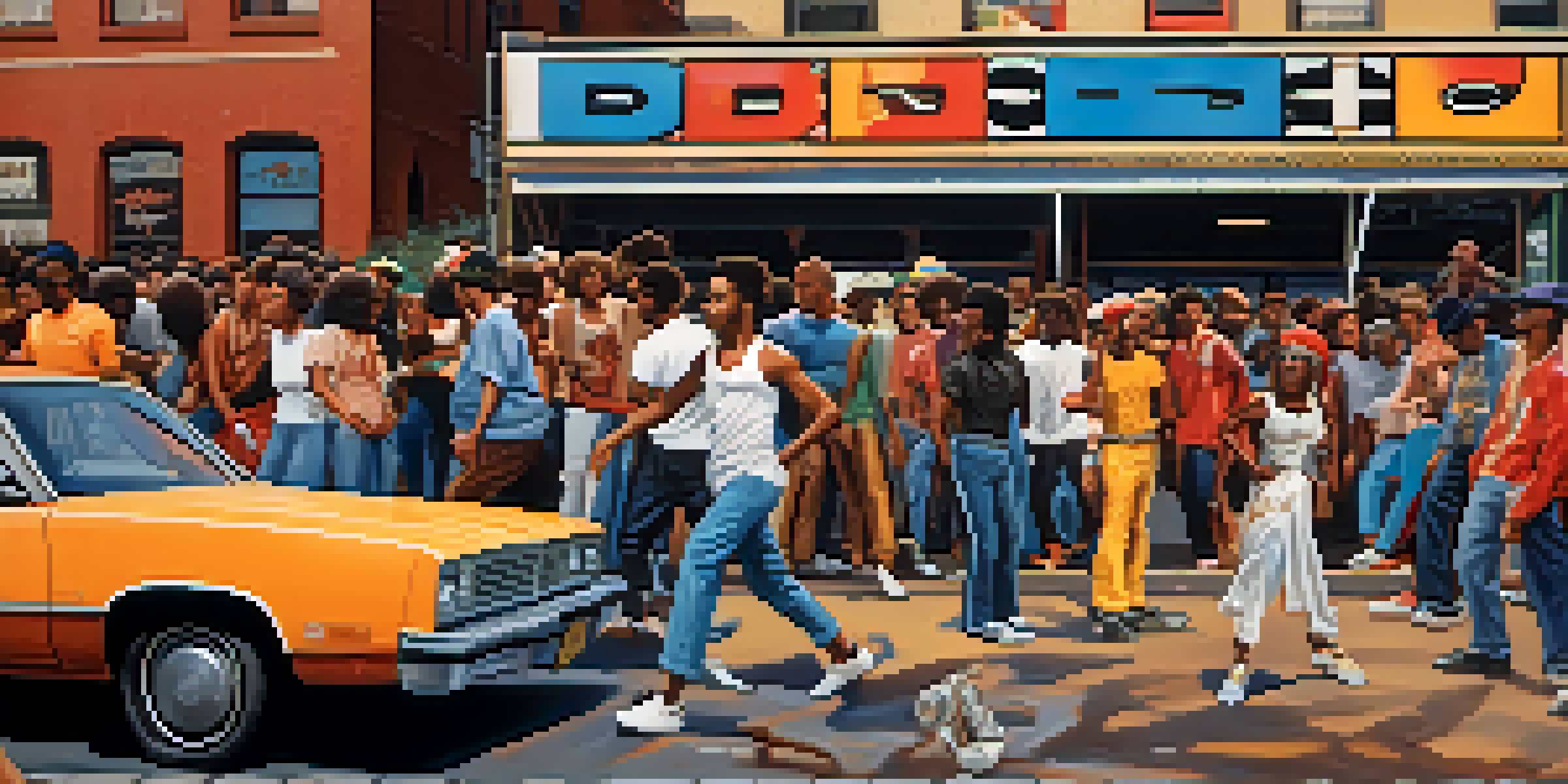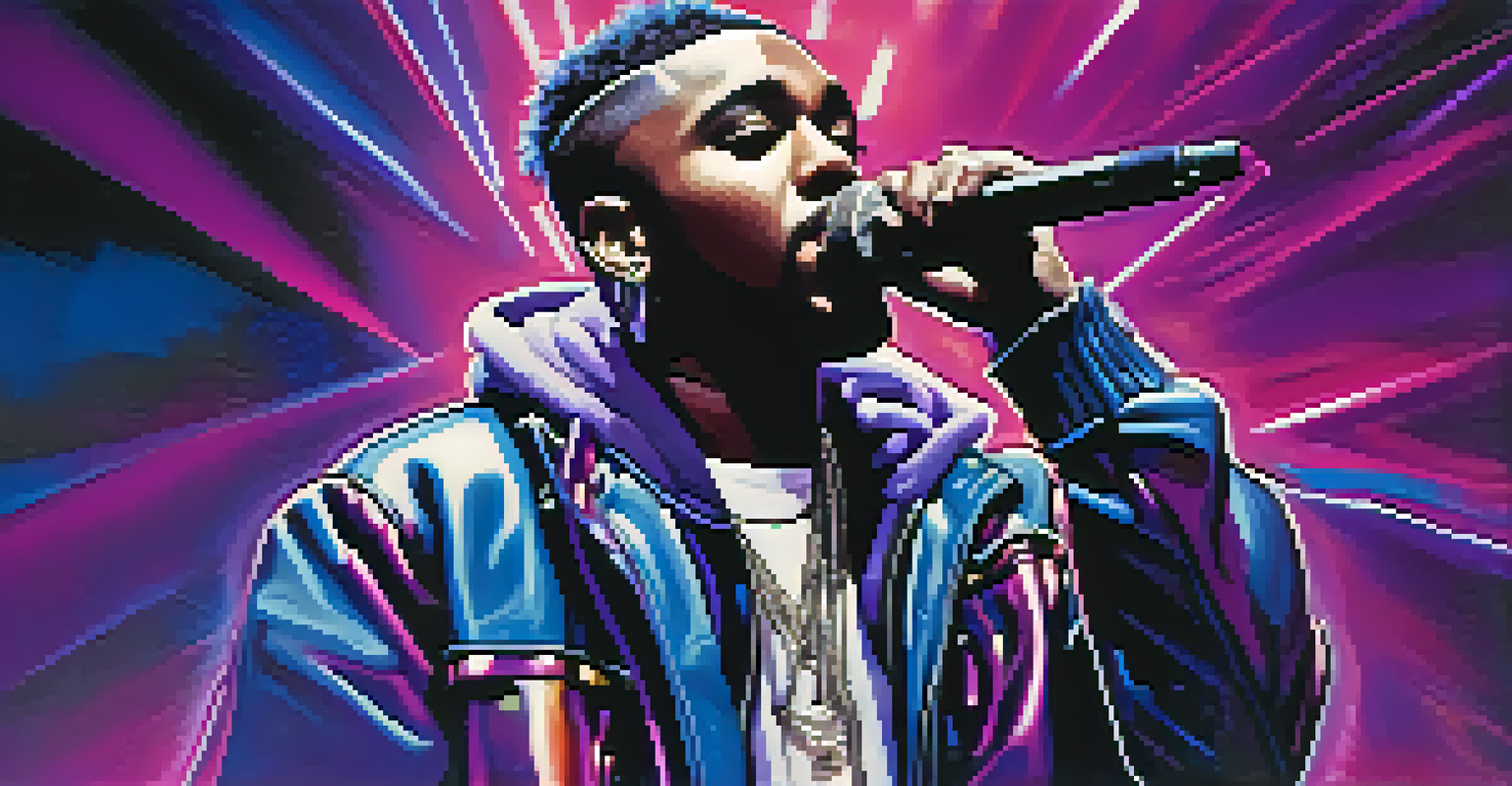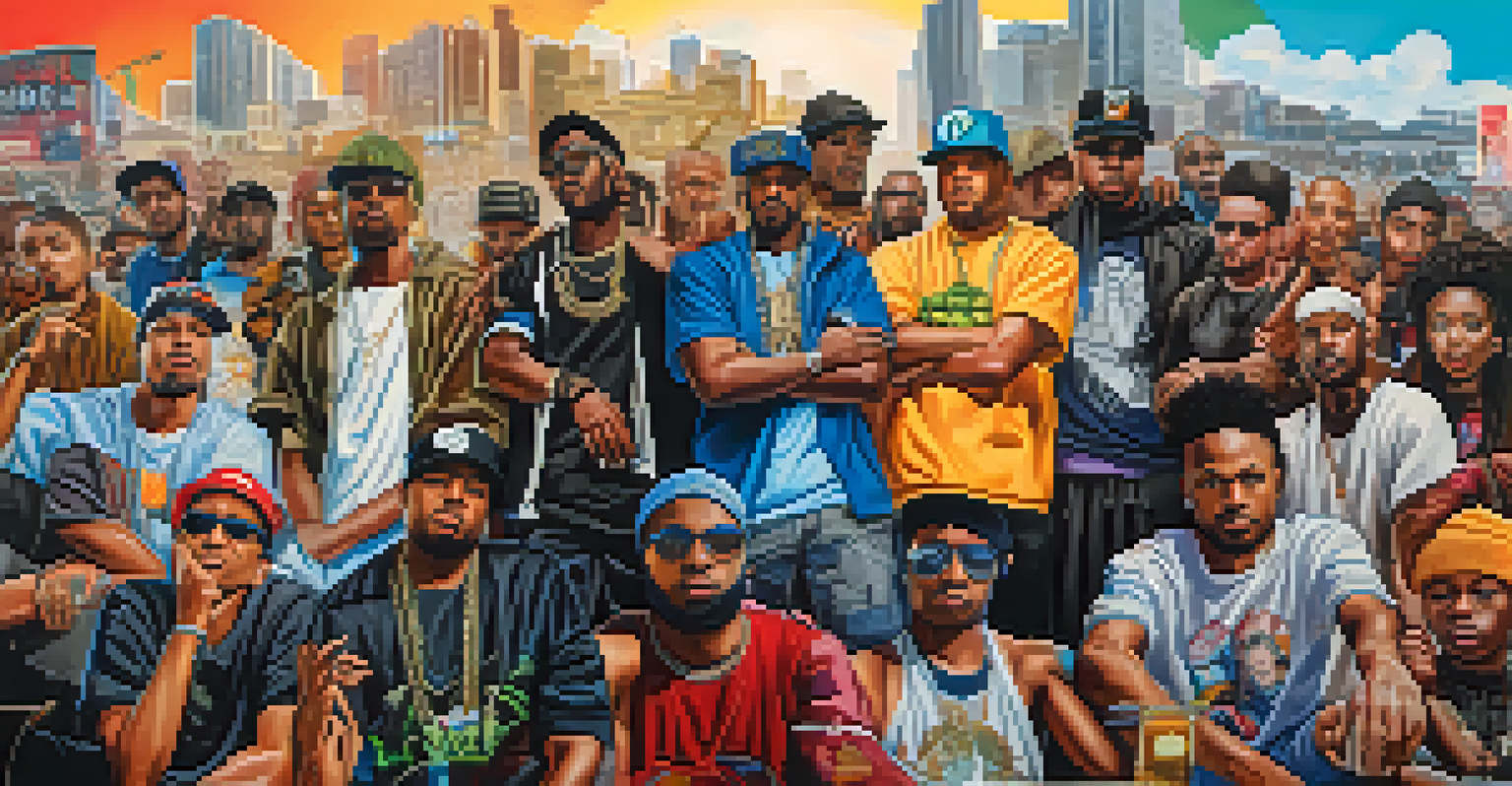The Role of Hip-Hop in Shaping Racial Identity and Activism

Understanding Hip-Hop: More than Just Music
Hip-hop is often seen merely as a genre of music, but it encompasses a rich culture that includes art, dance, and fashion. At its core, hip-hop originated in the 1970s in the Bronx, New York, as a response to social injustices faced by marginalized communities. This multi-faceted art form serves as a voice for the voiceless, allowing individuals to express their lived experiences and struggles.
Hip-hop has always been a voice for the voiceless, allowing individuals to express their lived experiences and struggles.
From graffiti on subway cars to breakdancing battles, hip-hop provided a platform for creativity and self-expression. It became a means for young people, particularly from African American and Latino backgrounds, to convey their frustrations and aspirations. This cultural movement laid the groundwork for hip-hop to evolve into a powerful tool for social change.
As hip-hop has grown globally, its influence on racial identity and activism has become more pronounced. Artists from different backgrounds have adopted the genre, using it to highlight their unique experiences and challenges. This universality demonstrates how hip-hop can transcend cultural boundaries while remaining rooted in its origins.
Hip-Hop and Racial Identity Formation
Racial identity is a complex construct, shaped by individual experiences and societal perceptions. Hip-hop plays a significant role in this process by providing a narrative framework for people to explore and express their racial identities. Through lyrics and performances, artists often address issues such as racism, inequality, and cultural pride.

For example, artists like Kendrick Lamar and J. Cole tackle themes of systemic oppression and the struggles faced by black communities. Their music resonates with listeners who see their own experiences reflected in these powerful narratives. By sharing personal stories, hip-hop artists contribute to a collective understanding of racial identity in contemporary society.
Hip-Hop as Cultural Expression
Hip-hop transcends music, serving as a rich cultural movement that encompasses art, dance, and fashion while addressing social injustices.
Moreover, hip-hop fosters a sense of belonging among listeners and creators alike. It creates a communal space where individuals can connect over shared experiences, further reinforcing their racial identity. This sense of unity is vital for marginalized groups, as it helps combat feelings of isolation in a society that often overlooks their struggles.
The Activist Roots of Hip-Hop
The roots of hip-hop are deeply intertwined with activism, dating back to its inception. Early hip-hop artists used their music to address social issues, such as police brutality and poverty, laying the groundwork for future generations. Groups like Public Enemy and N.W.A. were pioneers in this regard, making powerful statements through their lyrics.
The power of hip-hop lies in its ability to foster understanding and solidarity among marginalized communities.
These artists not only entertained but also educated their audiences about the harsh realities faced by their communities. Their bold messages sparked conversations and inspired movements, proving that hip-hop could be a force for social change. This legacy continues today, as modern artists carry the torch, using their platforms to advocate for justice and equality.
For instance, during the Black Lives Matter movement, many hip-hop artists have utilized their influence to raise awareness and mobilize support. Collaborations between musicians and activists highlight the ongoing fight for racial justice, demonstrating that hip-hop remains a vital part of the struggle for equality.
Storytelling as a Tool for Change in Hip-Hop
Storytelling is a cornerstone of hip-hop, allowing artists to share their experiences and perspectives. Through vivid narratives, they shed light on societal issues, encouraging listeners to empathize and engage with the stories being told. It's not just about the music; it's about the messages woven into the fabric of the lyrics.
For example, in songs like 'Fight the Power' by Public Enemy, the storytelling conveys a sense of urgency and demands for change. These powerful narratives can evoke strong emotions, prompting listeners to reflect on their own beliefs and actions. This emotional connection is a critical driver of activism, inspiring individuals to take a stand.
Storytelling Drives Activism
Through powerful narratives, hip-hop artists illuminate societal issues, fostering empathy and inspiring listeners to engage in activism.
Moreover, the storytelling aspect of hip-hop helps to humanize the struggles faced by marginalized communities. By sharing personal stories, artists create a bridge of understanding between different cultures and backgrounds, fostering empathy and solidarity. This narrative power is what makes hip-hop an essential tool for social change.
The Global Impact of Hip-Hop on Activism
While hip-hop originated in the United States, its influence has spread globally, resonating with diverse cultures and communities. Countries around the world have adopted hip-hop as a means to address their own social and political issues. From South Africa to Brazil, artists utilize the genre to voice their frustrations and advocate for change.
In many cases, local hip-hop scenes reflect the unique struggles faced by their communities, often paralleling the themes found in American hip-hop. For instance, South African artists like Nasty C and Sho Madjozi address issues such as poverty and inequality, connecting their experiences to a broader global narrative. This cross-cultural exchange emphasizes the universality of hip-hop as a tool for activism.
By embracing hip-hop, activists worldwide can share their stories and foster solidarity among marginalized groups. This global movement highlights the genre's power to unite people across borders, creating a collective force for change. As hip-hop continues to evolve, its role in shaping racial identity and activism will remain significant.
Challenges Faced by Hip-Hop Artists in Activism
Despite the power of hip-hop as a tool for activism, artists often face significant challenges in their efforts. Many encounter pushback from mainstream media and institutions that may be uncomfortable with their messages. This resistance can stifle creativity and limit the reach of their activism, making it difficult for artists to effect real change.
Additionally, the commercialization of hip-hop can dilute its activist roots, as artists may feel pressured to conform to mainstream expectations. This shift can lead to a focus on profit over message, undermining the genre's potential for social impact. As a result, some artists grapple with balancing their artistic integrity with the demands of the industry.
Global Influence and Solidarity
Hip-hop's global reach allows diverse communities to voice their struggles and unite around shared experiences, reinforcing its role as a tool for social change.
Moreover, the scrutiny faced by hip-hop artists, particularly those addressing controversial topics, can be intense. They often find themselves navigating a landscape fraught with criticism, where their intentions and messages may be misinterpreted. Despite these challenges, many artists remain committed to using their voices for activism, proving that the struggle for change is worth the fight.
The Future of Hip-Hop in Racial Identity and Activism
Looking ahead, the future of hip-hop in shaping racial identity and activism appears promising. As new artists emerge and the genre continues to evolve, there is a strong potential for hip-hop to address contemporary issues with fresh perspectives. This ongoing innovation ensures that the genre remains relevant and impactful in the fight for social justice.
Moreover, the rise of digital platforms enables artists to reach wider audiences, amplifying their messages and fostering global conversations around race and activism. Social media has become a vital tool for artists to share their stories, mobilize support, and connect with fans on a deeper level. This connectivity allows for a more significant exchange of ideas and experiences.

As hip-hop continues to inspire and empower new generations, its role in shaping racial identity and activism will only grow stronger. By embracing the genre's roots and pushing for innovation, artists can ensure that hip-hop remains a powerful force for change, connecting people and communities across the globe.